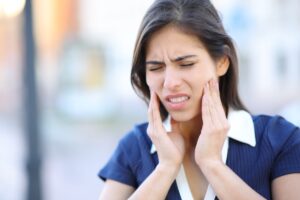Many people are aware of sleep apnea—a disorder where you stop breathing for brief periods of time during sleep. If you know of sleep apnea, you might associate it with snoring, and think of it as an inconvenience for a bed partner and nothing more. But there are many dangers of sleep apnea. The disorder is doing more than just making a person a loud sleeper—it actually has been (ironically) called a “silent killer.” In fact, patients with severe sleep apnea die on average 10 years sooner than those without.
85 percent of those who have sleep apnea don’t know they have it. This causes a lot of sleep apnea to go untreated—and untreated sleep apnea is dangerous.

A few consequences of untreated sleep apnea:
Danger of Sleep Apnea #1:
Lower immunity.
When you stop breathing for periods of time, oxygen is cut off. With sleep apnea, the pause in breath can be anywhere from 10 seconds to 2 minutes. This can happen as much as 50 times an hour or more. While patients do eventually breath again, the pause in breath causes the patient to take in less oxygen. The less oxygen your body takes in, the lower your immunity. This leaves you more susceptible to diseases.
Danger of Sleep Apnea #2:
Organs less likely to function properly.
When your body is deprived of oxygen over time, your organs cannot function at their highest capacity. This can lead to acid reflux, headaches, impotence, and any number of problems.
Danger of Sleep Apnea #3:
Heart problems
When you don’t breath for minutes at a time, your blood pressure rises. High blood pressure can lead to a heart attack, strokes, atrial fibrillation, congestive heart failure, insulin resistance and other heart problems.
Danger of Sleep Apnea #4: Greater chance of major illness.
Sleep apnea has been linked to major diseases like cancer and Type 2 Diabetes. People with sleep apnea have a 5 times gre ater chance of cancer. 65% of diabetics have sleep apnea.
Danger of Sleep Apnea #5:
Depression.
Less oxygen can lead to chemical imbalances, including depression.
Danger of Sleep Apnea #6:
Daytime tiredness.
People with sleep apnea often fail to enter deep sleep. When they stop breathing, their body arouses them from the sleep they are in to start breathing again. It isn’t a full awakening, so they may not even be aware this is happening. Deep sleep is where the most restorative sleep happens. Aside from snoring, daytime tiredness is the most reported symptom of those with sleep apnea.
Danger of Sleep Apnea #7:
Memory loss.
Related to the above, deep sleep assists with memory. If you are not entering deep sleep, your memory is impaired. In the long term, sleep apnea has been linked to a greater chance of Alzheimers and dementia.
Danger of Sleep Apnea #8:
Risky driving.
Sleep apnea can cause exhaustion, because patients with sleep apnea are not getting restful sleep. This increases the likelihood of getting into an accident, endangering yourself, those in the car, and other drivers.
Danger of Sleep Apnea #9:
Danger to bed partner.
If someone with sleep apnea snores, it’s not only dangerous to them—it’s dangerous to the bed partner. The average bed partner of someone with sleep apnea loses one hour of sleep a night. Often this is deep sleep, as the bed partner is pulled away from deep sleep by the noise of snoring. This much sleep loss—especially losing deep sleep—is very bad for long-term health.
Get Tested For Sleep Apnea
Approximately 20 percent of the adult population has sleep apnea. If you snore or feel inexplicably tired during the day, it is worthwhile to be tested. The test is simple—including a sleep study that is done at home. It could save your life.
“It’s unbelievable what we can do for patients,” said Dr. Rondeau. “I have so many patients who thank me for, number 1, saving their marriage, and number 2, prolonging their life.”






